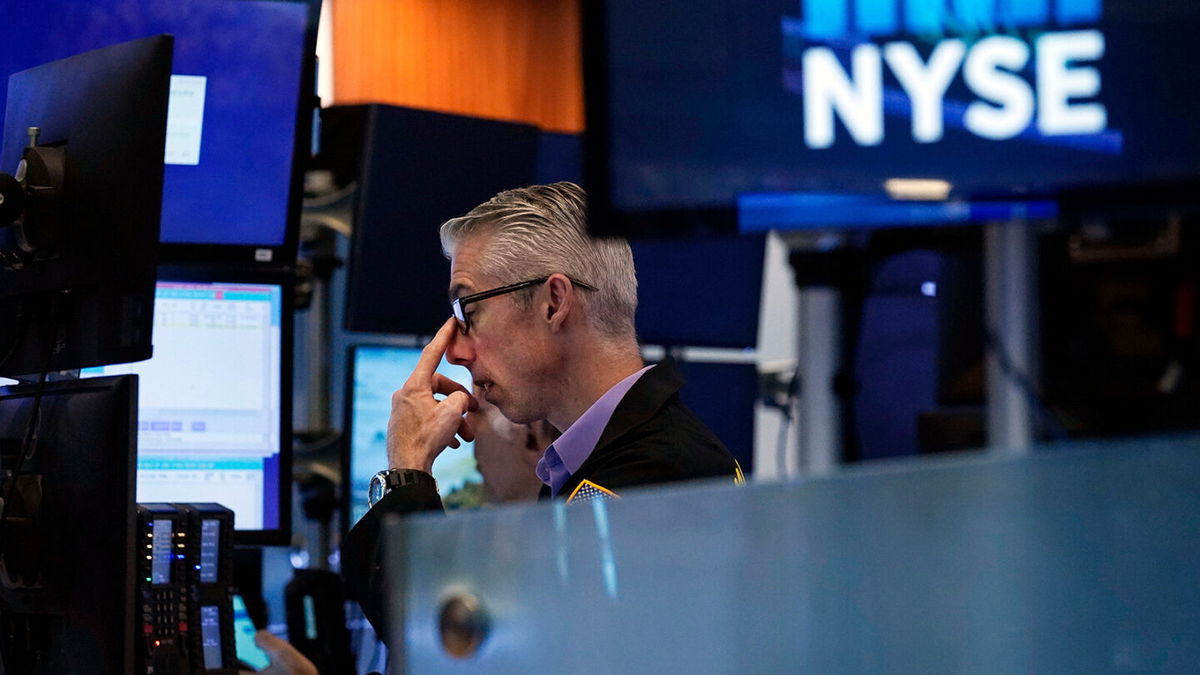Dow sinks more than 700 points on Delta variant fears

A trader works on the floor of the New York Stock Exchange
By Anneken Tappe, CNN Business
The Federal Reserve was already keeping a close eye on rising prices. Now it has to contend with the Delta coronavirus variant.
The highly contagious Delta variant of Covid-19 is racing across the globe, causing a shortage of workers in the United Kingdom and heaping stress on the battered global travel industry. Delta now makes up 83% of sequenced samples in the United States.
Fears about potential damage from the variant briefly spooked investors last week, sparking a sharp decline in stock prices on Monday. Investors were already worried about inflation, which could force the US central bank to pull back its support for the economy sooner than expected.
On Wednesday, we’ll hear if concerns about Delta have also infiltrated the Federal Reserve’s Open Market Committee. The Federal Reserve will give its monetary policy update at 2:00 p.m. ET, followed by a press conference with Chair Jerome Powell at 2:30 p.m. ET.
The central bank is not expected to make any policy changes. Instead, investors will be listening for clues about the strength of the economic recovery, and how the Federal Reserve is thinking about the future of its stimulus programs.
What policymakers think about inflation is crucial. The US consumer price index jumped 0.9% in June, the largest one-month increase in 13 years. Over the last 12 months, prices rose 5.4%, the biggest jump in annual inflation in nearly 13 years.
Powell has consistently said that he expects inflation to moderate. But pressure on the central bank is growing, with some economists arguing that the Fed should start tapering its bond purchases later this year in preparation for interest rate hikes that would help get price rises under control.
Delta makes these decisions even harder.
Another surge in coronavirus cases could prevent battered supply chains from getting back to normal, which would in turn keep the pressure up on prices. At the same time, Delta could knock some wind out of the recovery, leading to lower demand and reducing pressure on prices, too.
In the United Kingdom, where Delta is driving a sharp increase in coronavirus cases, there is already some evidence of the former. Supermarkets in some areas ran out of select products last week, and some gas stations ran dry after hundreds of thousands of workers were forced to isolate because of the virus.
“The Delta variant could cause other developed economies, and China, to shut down again. That could snarl already fractured supply chains, putting another drag on economic growth,” said Dan North, senior economist at the insurer Euler Hermes.
In short, the variant has brought more uncertainty.
Some economists believe it will only affect a handful of industries in the United States, where widespread lockdown restrictions are unlikely to be imposed again. Others worry that Delta could delay the restart of in-person schooling and therefore derail the jobs recovery.
Economic gut check
US investors will also be treated to an economic status check next week.
The first read of gross domestic product, the broadest measure of economic activity, will be released on Thursday at 8:30 a.m. ET. Economists polled by Refinitiv predict America’s economy grew at an annualized pace of 8% between April and June, up from 6.4% in the first quarter.
But there are signs that the recovery may not be quite as strong as some hoped.
IHS Markit downgraded its global growth forecast for 2021 by 0.2 percentage points to 5.8% last week. At the same time, IHS slashed its prediction for US growth in 2021 from 7.4% to 6.6%, primarily because of weaker consumer and business spending in May.
“The recovery remains on solid footing owing to a nearly complete recission of pandemic containment measures, expansionary fiscal and monetary policies, and restocking of depleted inventories,” IHS said.
IHS expects inflation to prompt the Federal Reserve to taper its asset purchases later this year, and hike the federal funds rate in 2023.
Up next
Monday: US new home sales; Earnings from LVMH, Lockheed Martin and Tesla
Tuesday: US consumer confidence; Earnings from 3M, General Electric, UPS, Apple, Google parent Alphabet, Microsoft, Starbucks and Visa
Wednesday: Earnings from Boeing, McDonald’s, Facebook, Qualcomm, Nissan, Barclays, Deutsche Bank and Rio Tinto
Thursday: US Q2 GDP; Earnings from ArcelorMittal, Comcast, Merck, Northrop Grumman, Samsung, Nestle, AB InBev, Volkswagen, Shell, Total, AstraZeneca, Credit Suisse and Airbus
Friday: US personal income and spending; Earnings from IAG, Renault, BNP Paribas, Caterpillar and Exxon Mobil
The-CNN-Wire
™ & © 2021 Cable News Network, Inc., a WarnerMedia Company. All rights reserved.

